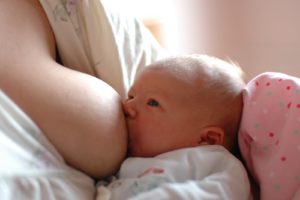 Another good reason to breastfeed. Exposure to pollutants like nitrogen dioxide and airborne particles can cause negative effects on motor and mental development in infants, but a new study says those effects are countered in babies who are breast-fed for at least 4 months by their mothers. Researchers in Spain began monitoring rural, pregnant women in 2006 and analyzed samples from 638 women and their infants at 15 months. They reported that babies who are breast-fed did not suffer from the potentially harmful developmental impact of PM2.5 (pollution particle matter) and NO2 (nitrogen dioxide). From Science Daily:
Another good reason to breastfeed. Exposure to pollutants like nitrogen dioxide and airborne particles can cause negative effects on motor and mental development in infants, but a new study says those effects are countered in babies who are breast-fed for at least 4 months by their mothers. Researchers in Spain began monitoring rural, pregnant women in 2006 and analyzed samples from 638 women and their infants at 15 months. They reported that babies who are breast-fed did not suffer from the potentially harmful developmental impact of PM2.5 (pollution particle matter) and NO2 (nitrogen dioxide). From Science Daily:
Breastfeeding protects against environmental pollution
Living in a city with a high level of vehicle traffic or close to a steel works means living with two intense sources of environmental pollution. However, a study conducted by the UPV/EHU researcher Aitana Lertxundi indicates that the harmful effect of PM2.5 pollution particle matter and nitrogen dioxide (NO2) disappears in breastfed babies during the first four months of life. According to the results of the research, breastfeeding plays a protective role in the presence of these two atmospheric pollutants.
Lertxundi's study focusses on the repercussions on motor and mental development during the first years of life caused by exposure to the PM2.5 and NO2 atmospheric pollutants .... "In the fetal phase the central nervous system is being formed and lacks sufficient detoxification mechanisms to eliminate the toxins that build up," pointed out Aitana Lertxundi.
The PM2.5 particles measure less than 2.5 micra, in other words, they are four times thinner that a single hair and are suspended in the air. As they are so small they can easily penetrate the body and as they weigh so little they can spread without any difficulty through the air and can move far away from the initial emission source. The composition of these neurotoxic particles depends on the emission sources in the area. The INMA Gipuzkoa area under study has a high presence of neurotoxic particle matter made up of lead, arsenic and manganese from industrial activity and traffic. In comparison with urban averages where the main source of pollution is traffic, the concentration is lower.
One result of the study is that the existence of an inverse relationship has been detected between exposure to pollution particle matter and the motor development of babies. In this respect, the researcher highlights the fact that "these indices display an alteration with respect to the average and, even if they are not worrying, they are significant in that they reveal the relationship existing between air quality and motor development." The analysis of the data also shows that neither the PM2.5 particle matter nor the NO2 exert a harmful effect on babies breastfed on mother's milk for at least four months.
